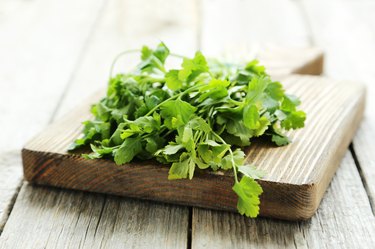
In the culinary world, parsley's status hovers between herb and vegetable. While appreciated for its ability to add color and texture to foods, parsley is under-utilized as a vegetable rich in vitamins A, C and K. As with most foods, eating extremely high amounts of parsley might pose some risks. It most often appears on the "caution" list for people with kidney stones. Vitamin toxicity is theoretically possible, albeit unlikely.
Oxalates
Video of the Day
For some people, the natural plant chemicals known as oxalates might cause problems. People with kidney stones or who are prone to kidney stones should avoid or limit oxalate-rich foods, notes Drugs.com. The medical web site puts parsley in the "limit" category rather than in the class of foods you should avoid altogether, which includes strawberries, beets, spinach, rhubarb, coffee and chocolate. While several types of kidney stones exist, the most common are calcium oxalate stones, according to MayoClinic.com. If your doctor identifies your kidney stones as belonging to the calcium oxalate class, she will likely advise you to consume less oxalate. Save parsley for garnishing foods by the tablespoon, rather than adding heaping helpings of the vegetable to soups or salads.
Video of the Day
Vitamin C
If you ate nothing but parsley for vitamin C, you'd have to eat between 3 and 15 cups a day to overdose on the vitamin. But a daily intake of large amounts of parsley, combined with other C-rich foods and vitamin C supplements, could lead to toxicity. A 1 cup serving of fresh parsley contains 133 mg of the vitamin. Children under 3 should not exceed 400 mg of vitamin C each day, while the limit for adults is 2,000 mg. According to the Linus Pauling Institute, theories linking excess vitamin C with birth defects or vitamin deficiencies currently are unproven.
Vitamin K
Parsley contributes a high amount of vitamin K. The vegetable contains 1,640 micrograms of the nutrient per cup, almost 20 times the minimum amount recommended for adults and more than 50 times more than the daily value for children. Yet even high amounts of parsley contain little risk of causing a vitamin K overdose, according to Linus Pauling Institute. Toxicity from synthetic forms of the vitamin is far more likely. People on warfarin or other blood-thinning medications, however, should avoid high amounts of parsley. Excessive vitamin K intake from food or supplemental sources could interfere with your medication's effectiveness.
Vitamin A
A 1 cup serving of fresh parsley contains 8,242 IUs of vitamin A. In general, overdosing on vitamin A supplements represents a greater risk than consuming too much of it through foods like parsley, according to Linus Pauling Institute. When vitamin A is taken in supplement form, children should not consume more than 2,000 to 3,000 IUs, while teens and adults should keep their intake to between 9,000 and 10,000 IUs. Ask your doctor if it is safe to eat high amounts of parsley while taking vitamin supplements. Toxicity from too much vitamin A carries risks of birth defects, liver failure and an increase in your triglycerides.
- Drugs.com: Low Oxalate Diet
- Linus Pauling Institute; Vitamin K; Jane Higdon, Ph.D.; May 2004.
- Linus Pauling Institute; Vitamin C; Jane Higdon, Ph.D.; Jan 2006.
- Linus Pauling Institute; Vitamin A; Jane Higdon, Ph.D.; Dec. 2003.
- RecipeTips.com: USDA -- Nutrition Information For Parsley, Raw
- University of Maryland Medical Center: Vitamin A